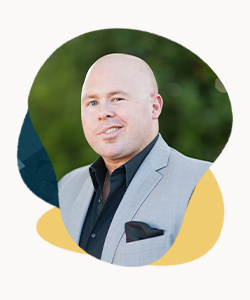 We strive for innovation at Oracle, and a major part of that is creating a culture where every employee can achieve more. Bryan Fulton, a consulting member of technical staff at Oracle Cloud Infrastructure (OCI), is not only an exceptional engineer; he’s also an exceptional leader who embodies the spirit of embracing differences and getting down to work.
We strive for innovation at Oracle, and a major part of that is creating a culture where every employee can achieve more. Bryan Fulton, a consulting member of technical staff at Oracle Cloud Infrastructure (OCI), is not only an exceptional engineer; he’s also an exceptional leader who embodies the spirit of embracing differences and getting down to work.
His professional journey is one of resilience, adaptability, and a deep-rooted passion for technology. It’s taken him to the top of engineering and promises to make a lasting impact on the industry.
Day to day, he provides strategic guidance to senior leadership and designs new services. He also acts as the technical liaison between various teams and services. Currently, his main focus is on our Zero Trust Platform.
Hooked on computer science
Bryan’s path to Oracle was shaped by a lifelong passion for technology and problem solving, but he didn’t always see himself in tech.
“After my first round of brain surgery in high school, I was pretty set on the medical field, particularly neurosurgery,” he shares. It was only when a deeper interest in computer science and engineering took hold that he considered other options. “I tried a few computer science courses, and I was hooked. I really liked the logic, the creativity, and problem solving.”
Back then, he had no idea just how far his curiosity would take him. He’d always been a tinkerer and gadget lover, but his newfound knowledge soon launched him into founding and working with multiple startups.
Digging in
Soon, his expertise grew in diverse areas like enterprise-grade authorization services, software-defined networking, and application security. All of this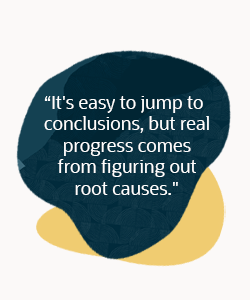 added up to a set of skills and a three-part problem-solving approach vital to his career at Oracle.
added up to a set of skills and a three-part problem-solving approach vital to his career at Oracle.
First, he focuses on understanding what’s really going on, then he collaborates with the right people before transitioning to steady progress. “The first thing I do is dig into the problem,” he explains. “It’s easy to jump to conclusions, but real progress comes from figuring out root causes.”
In practice, Bryan dives deep into issues by analyzing data and engaging with stakeholders to identify issues. Collaboration is vital, and he’s found an incredible talent pool to leverage here. The open and inclusive environment also means everyone can contribute to solutions.
Building effective teams
Teamwork is an intrinsic part of the hiring process for OCI. “I look for engineers who have a rock-solid grasp of computer science fundamentals and a track record of excellence and learning quickly. Specialized skills can be taught, but having the core knowledge, curiosity, and a willingness to step outside your comfort zone is essential,” he explains.
He believes there’s no secret to great teams—although the most effective ones share two qualities he’s seen time and again: purpose and openness.
“You hire highly intelligent individuals with different skills, different backgrounds, and different perspectives. And once the people are in place and have clearly defined goals—then prioritize communication and collaboration,” he shares.
“I look for people that are easy to work with, people that leave the ego at the door and value constructive criticism. Failures are invaluable, and I value members who can reflect on the mistakes, 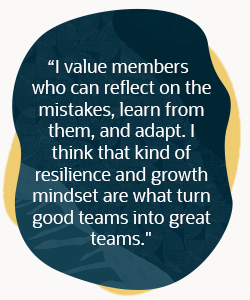 learn from them, and adapt. I think that kind of resilience and growth mindset are what turn good teams into great teams.”
learn from them, and adapt. I think that kind of resilience and growth mindset are what turn good teams into great teams.”
Empowered to adapt
Adaptability matters to Bryan, and as a professional living with deafness, he has a unique perspective on what that means at work. He’s already touched on how his experiences almost influenced him into a neurosurgery career, but there’s another side to his story.
When Bryan was 14, he developed a tumor that required surgery, and the procedure to remove it left him deaf in one ear. He adapted and continued to pursue computer science and music, but a few years later, he underwent a second surgery to treat another tumor. This time resulting in complete deafness.
Now, he relies on an auditory brainstem implant (ABI) for hearing, which he combines with lipreading and Zoom captions to keep the collaboration flowing.
“When it comes to empowering people to take on more responsibility, I think there’s a human side and a technical side,” he explains. “You can empower disabled employees by creating an environment where they can thrive. Whether that’s considering physical barriers like accessibility, flexible working, or real-time captions like I use.”
When engaging with colleagues or clients, Bryan is open about his needs, explaining that he relies on captions to follow conversations. 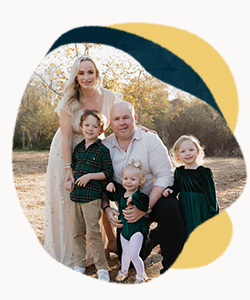
“I just let folks know if I cut them off, it’s not intentional. I also apologize if I ever ask them to repeat something. The captions can be kind of gobbledygook sometimes!” He draws an interesting parallel between lipreading and Morse code, highlighting the importance of context when deciphering information.
“When you lip-read, you don’t read every word. Think back to Morse code during wars, when those signals are coming in and they’re hearing dots and dashes. They’re not writing every letter, because if they miss one, they get lost. You keep a kind of buffer in your head.”
The Oracle Diverse Abilities Network (ODAN) employee resource group emphasizes the importance of leaders being open about their disabilities. This openness provides freedom and encouragement for others, creating an inclusive environment where all abilities are celebrated.
“Lifting folks up is about sponsoring, about visibility—representation is powerful,” Bryan adds. “If you see leaders that have disabilities, that breaks stereotypes and inspires others.”
Lead by looking ahead
Adapting and learning is vital to leadership, and it’s a quality Bryan encourages aspiring leaders to embrace as soon as possible.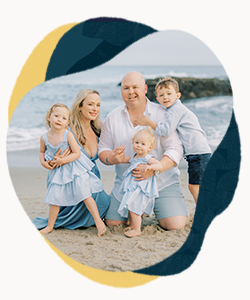
“One of the biggest things that I learned from my Dad is to just stay curious. Tech moves fast and you’ve got to keep learning. Read books, read papers, read the blogs of other engineering teams, take classes, and just keep learning and adapting,” he urges.
“Aspiring leaders should focus on building genuine relationships, trust, and collaboration. Listen more than you talk. Or in my case, read the captions! Own the hard stuff and try to be someone who’s focused on looking ahead.”
Rather than imposing your own methods on teams, Bryan encourages leaders to empower people to take ownership and innovate solutions themselves. It’s about making a positive impact that gets results, rather than just personal achievements.
“I like taking risks, trying big, bold things. Kind of cliché, but it’s very true! You have to take risks and push the limits to be able to truly build new, valuable products. That has to be about helping your customers, helping your colleagues, and helping others grow. That’s how you know you’re doing your best work.”
Lead your way at Oracle and help make the world a better place through inclusive solutions. Explore our latest career opportunities now and join the Oracle Talent Network for advice, insights, and more.
